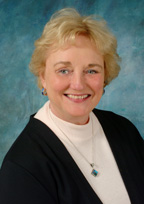For Barbara Piper, D.N.S., the drive to help cancer patients manage their fatigue began in 1977. She was taking care of a cancer patient whose fatigue disrupted her life so much that she refused another potentially life-saving treatment.
Dr. Piper, associate professor of nursing at UNMC, recently was honored for her significant, international contributions in cancer care. Dr. Piper received the Robert Tiffany Memorial Lectureship Award at the 12th International Conference on Cancer Nursing on Aug. 28-Sept. 1 in London, England. The award honors a nurse who has made significant contributions nationally or internationally in cancer practice, education, research or management.
The award memorializes Tiffany’s contributions and visionary leadership in cancer nursing. Tiffany, who started his career in cancer nursing in 1967, went to the Royal Marsden Hospital in London to take an oncology nursing course. Twenty-six years later, he had reportedly transformed the hospital and specialism of cancer nursing beyond recognition.
The award has been given three times: twice to Europeans and once to an American.
Dr. Piper: “An incredible honor”
“While it was an incredible honor to just be nominated for this prestigious international award, to actually be the recipient of it and not have it be a posthumous award, is very special,” Dr. Piper said. “The award is particularly meaningful to me, since I knew Bob when he was still alive and had the pleasure of attending one previous award lectureship.”
Dr. Piper received an all expense-paid round trip to the conference, an honorarium, a plaque and a reception given in her honor. During the conference, she presented a one-hour lecture titled “Cancer-Related Fatigue: Past Perspectives… Future Imperatives.” She also facilitated a roundtable discussion.
Dr. Piper, whose curriculum vitae is steep with grant contracts, consultant work and presentations dealing with fatigue and breast cancer, was principal investigator of the first international cancer-related fatigue investigation ever conducted.
“I am very much looking forward to stimulating additional research in this area,” she said.
Fatigue is the most common side effect cancer patients experience from treatment, as well as the most distressing one, Dr. Piper said.
“A pioneer in fatigue research”
Dr. Piper was nominated by Paula Rieger, president of the National Oncology Nursing Society, along with two other individuals, Agnes Glaus, Ph.D., president of the European Oncology Nursing Society, and Victoria Mock, Ph.D., associate professor and director of nursing research at Johns Hopkins University.
“She is a pioneer in fatigue research and has developed a theoretical framework for fatigue and the Piper Fatigue Scale, which is one of the few multidimensional tools available to measure fatigue,” one of the nominators wrote. “Barbara is unique among nurses in the United States, in that she is one of the few that has gained worldwide recognition for her work. She has mentored nurses from all over the world in their work on fatigue and has furthered their understanding of the management of this symptom.”
Dr. Piper is a member of a variety of organizations, including the American Society of Clinical Oncology, the Oncology Nursing Society, as well as co-chairing the Cancer Fatigue Study Group of the Multinational Association of Supportive Care in Cancer. She has received many awards, including becoming a fellow in the American Academy of Nursing.
She has published about 80 abstracts and proceedings and made 146 presentations and/or panel discussions all over the United States and the world. She has published more than 15 book chapters on cancer-related fatigue.
Dr. Piper’s career path
Dr. Piper graduated in 1965 with a bachelor’s degree in nursing from the Syracuse University School of Nursing. In 1972, she earned a master’s degree, and in 1992, a doctorate degree from the University of California San Francisco School of Nursing.
Dr. Piper began her academic career in nursing in 1973 as a nursing instructor at the College of Marin, Kentfield, Calif. In 1979, she served as associate clinical director of a post-master’s nursing fellowship program in oncology nursing education at San Jose State University, while serving as continuing education specialist in cancer nursing at the University of California San Francisco School of Nursing. From 1986 to 1990, she served as a teaching assistant at UCSF, where in 1994, she became an associate clinical professor there, a title she continues to hold.
In 1996, she became an associate professor at the UNMC College of Nursing and in 2001 was appointed as a graduate faculty fellow.